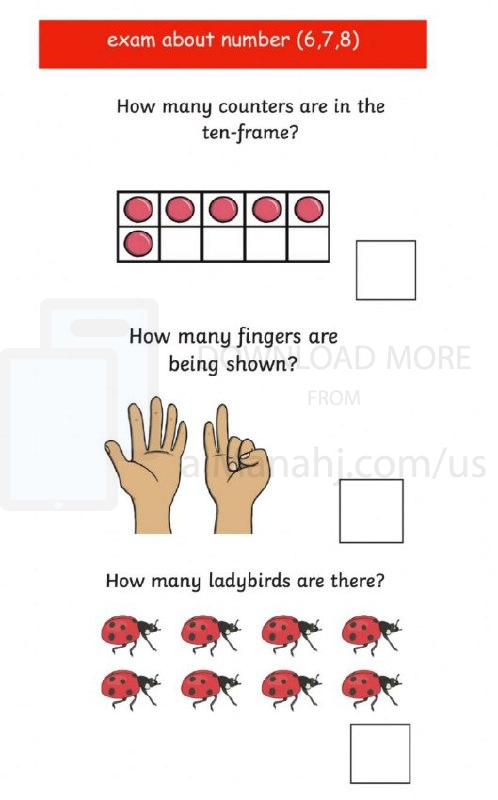| File info: An exam about the numbers 6, 7, and 8 would likely cover a variety of topics, including:
Number sense: Students would be asked to demonstrate their understanding of the numbers 6, 7, and 8, including their place value, relationships to other numbers, and operations. For example, students might be asked to:
Identify objects that represent the numbers 6, 7, and 8.
Compare and order the numbers 6, 7, and 8.
Solve addition, subtraction, multiplication, and division problems involving the numbers 6, 7, and 8.
Number patterns: Students would be asked to identify and describe patterns involving the numbers 6, 7, and 8. For example, students might be asked to:
Continue patterns involving the numbers 6, 7, and 8.
Identify the next number in a pattern involving the numbers 6, 7, and 8.
Create their own patterns involving the numbers 6, 7, and 8.
Number application: Students would be asked to apply their knowledge of the numbers 6, 7, and 8 to real-world situations. For example, students might be asked to:
Use the numbers 6, 7, and 8 to count objects or measure quantities.
Solve problems involving the numbers 6, 7, and 8 in a story or context.
Use the numbers 6, 7, and 8 to make predictions or draw conclusions.
The specific format and content of the exam would vary depending on the level of the students being tested. For younger students, the exam might focus on basic number sense and patterns. For older students, the exam might include more challenging questions involving operations and application.
Here are some examples of specific questions that could be asked on an exam about the numbers 6, 7, and 8:
Number sense:
Which number is greater: 6 or 7?
What is the next number in the pattern 6, 7, 8, 9?
What is the sum of 6 and 7?
Number patterns:
Continue the pattern 6, 7, 8, 9.
What is the next number in the pattern 6, 12, 18, 24?
Create a pattern using the numbers 6, 7, and 8.
Number application:
There are 6 apples in a bowl. How many more apples are needed to make 10 apples?
It takes 6 minutes to get to school. If I leave in 5 minutes, how late will I be?
There are 7 red cars in a parking lot. What is the probability that the next car I see will be red?
I hope this helps! |
